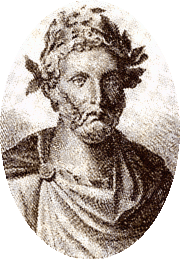Titus Maccius Plautus
- Oct 28, 2018 - Works[edit]. (surviving plays). Amphitryon; Asinaria; Aulularia; Bacchides; Captivi; Casina; Cistellaria; Curculio; Epidicus; Menaechmi; Mercator.
- Plautus, Titus Maccius Part II discusses Roman examples, including in triumph and Saturnalia, Plautus, the Priapus painting at the house of Vettii, Pompeiian graffiti, and the Carmina Priapea. Ancient Obscenities: Their Nature and Use in the Ancient Greek and Roman Worlds.

This is a book worthy of high praise. . . . All versions are exceedingly witty and versatile, in verse that ripples from one’s lips, pulling all the punches of Plautus, the knockabout king of farce, and proving that the more polished Terence can be just as funny. Accuracy to the original has been thoroughly respected, but look at the humour in rendering Diphilius’ play called Synapothnescontes as Three’s a Shroud. . . . Students in schools and colleges will benefit from short introductions to each play, to Roman stage conventions, to different types of Greek and Roman comedy, and there is a note on staging, with a diagram illustrating a typical Roman stage and further diagrams of the basic set for each play. The translators have paid more attention to stage directions than is usually given in translations, because they aim to show how these plays worked. This is a book to be used and enjoyed. --Raymond J. Clark, The Classical Outlook
Titus Maccius Plautus Plautus, Titus Maccius (254-184 BC) was a Roman playwright, whose comedies were the most popular dramatic works of their day. He was originally an actor or clown.
'synopsis' may belong to another edition of this title.
EditOverview (2)
Titus Maccius Plautus Menaechmi
| Born | in Sarsina, Italy |
| Died | in Rome, Italy |
Mini Bio (1)
Latin poet and dramatist, who was born at Mercato Saraceno in Umbria. Some authorities credit him with upto 130 comedies however only 21 are certain. These include: Amphitryo Jupiter, Asinaria (Comedy of Asses), Aulularia (Pot of Gold), Bacchides, Captivi (Prisoners of War), Casina, Cistellaria (Casket-Comedy), Curculio (The Weevil, the name of a parasite in the play), Epidicus, Menaechmi (The Two Menaechmuses), Mercator (Merchant), Miles Gloriosus (Braggart Warrior), Mostellaria (Ghost), Persa, Poenulus (Little Carthaginian), Pseudolus, Rudens (Rope), Stichus, Trinummus (Three-Dollar Day), Truculentus and Vidularia (Tale of a Traveling Chest). Plautus borrowed his plots from the Athenian New Comedy, the leading exponent of which had been Menander. It dealt with the personal preoccupations of ordinary men and women. His New Comedy plots were highly elaborate, consisting largely of numerous confusions, misunderstandings, surprising turns of fortune, and, above all, a great deal of amusing trickery. Plautus achieved immense popularity as a playwright, and repeatedly brought his spectators to their feet in enthusiastic applause. His comedies were revived time after time during the subsequent centuries of antiquity. He influnece can be seen in Shakespeare's Comedy of Errors, as well as in many of the plays of Ben Jonson.
- IMDb Mini Biography By: Sujit R. Varma